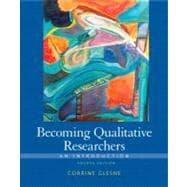This text offers a brief, but comprehensive overview of qualitative research that balances the practicalities of conducting research and the theory and debates that keep qualitative inquiry vibrant. As faculty and students increasingly turn to qualitative inquiry, they need a text that will not only provide them with an understanding of qualitative research methods, but also open them to the diverse possibilities within this inquiry approach.
This text covers the range of possibilities along with numerous exercises that offer beginning students the opportunity to practice and refine the skills of being a qualitative researcher. The wealth of examples in the text is exceptional, as is the accessible writing style.
‘’My first reaction to experimental writing was this is for people with a background in the arts I am not a creative person. Taking Glesne's Qualitative Analysis and Writing course opened my very closed view of qualitative research into one with endless possibilities .Thank you for exposing me to new ways to view and present my research data. Anyone who has a desire to express their research creatively should take this course.’’- Leslye Kornegay
‘’Dr. Glesne encourages qualitative researchers to approach their data in fresh, dynamic ways, including poetic transcription and dramatic representation. These creative methods challenged me to examine my data using new perspectives, and allowed me to represent the voices of my participants more authentically. It was such a pleasure working with Dr. Glesne and learning from all of her experiences.’’- Bethany Rice
‘’I have often kept my structured self apart from my creative self. From a young age we are taught that to be an academic requires being structured. We are taught that being an academic means following the rules. Therefore, creativity becomes a frill on the sidelines of true scholarship. I have struggled over the years to place my creative side in a box in order to be recognized as intelligent or legit. I have felt this as both a student of art and a teacher of it. Although there have certainly been times when I see these selves overlap and influence one another, they have always remained separate yet equally important elements of who I am. Glesne's classes, and book, have challenged me to bring together, once and for all, my structured self and my creative self. I know I have a long way to go, but I feel inspired and supported to take risks in order to truly and fully express myself in my work. Thank you.’’- Ellen Montgomery









